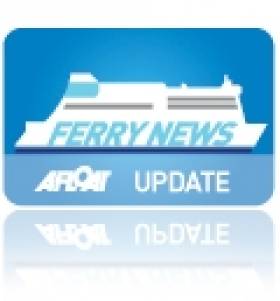Displaying items by tag: Cork County Mayor
Ferry With 'Tourist Office' Celebrates 100,000th Passenger
In addition passengers travelling on the Julia can visit the newly installed tourist office where an advanced booking system will be available for all accommodation, leisure, and hospitality facilities located on both sides of the Irish Sea.
Irish and Welsh members of the West Cork Tourism Co–Operative, which established the ferry operation will staff the tourist office full-time during the summer months. The facility is unique to Irish-UK ferry services and was officially opened by the new Cork County Mayor Tim Lombard. For further information from the co-operative click www.westcork.ie and more about the other on board facilities click HERE.
With competition from summer sells on offer from rival operators on the Irish Sea, in particular on St. Georges Channel services, Fastnet Line are combating with deals to encourage higher occupancy sailings during the peak season.
The company are also preparing to accommodate Irish soccer fans in the autumn, following the success of Swansea City F.C. in gaining promotion to the Premiership.
- Cork Harbour
- port of Cork
- Fastnet Line
- M.V. Julia
- Ports and Shipping News
- CorkSwansea
- Cork Harbour News
- Julia
- Ferry news
- Swansea City F.C.
- Premiership
- Premiership League
- Irish soccer fans
- Swansea drydock
- WestCork Tourism CoOperative
- Cork County Mayor
- Cork County Mayor Tim Lombard
- Mayor Tim Lombard
- St. Georges Channel
- Irish Sea ferry news
























































